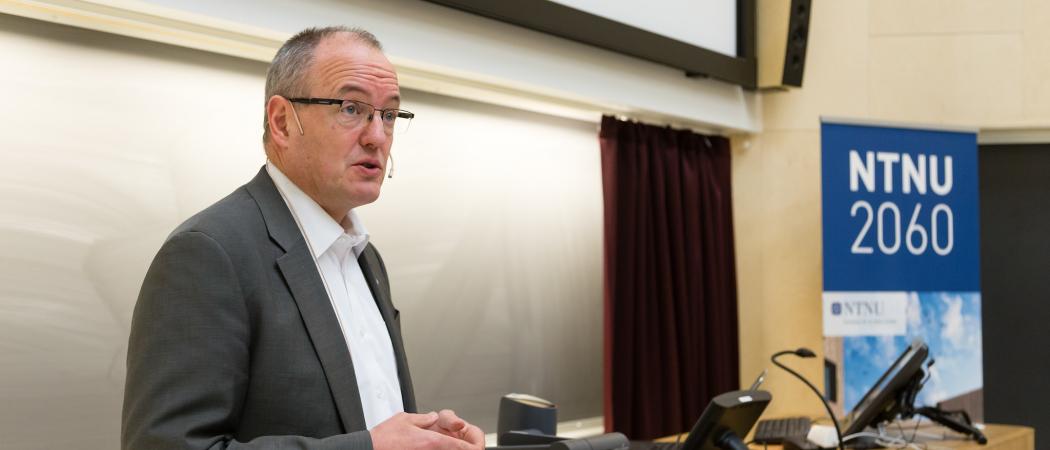As he resigns as rector of the Norwegian University of Science and Technology, Gunnar Bovim calls for the EU to attract more women project leaders to its research programmes. Fixing the gender gap in academia is ‘not trivial’, he says

Photo: Thor Nielsen/NTNU Komm.avd.
Fixing gender inequality in academia is no trivial matter and the EU should play a part by making its research and innovation programme more attractive to women, says Gunnar Bovim, ex-rector of the Norwegian University of Science and Technology (NTNU). “It would be a better Europe if we had gender equality in project leadership in Horizon Europe,” he told Science|Business.
Earlier this month, Bovim announced he was ending his term as rector after six years at the helm of the university, after confirming he is in a romantic relationship with Merete Kvidal, a project director for campus development at NTNU. “The relationship between [Kvidal] and myself has triggered some challenging dilemmas for NTNU,” Bovim said when the university announced his departure from the top post.
Bovim said it has been a privilege to work for 20 years in top management positions at research and academic institutions, six of which he spent as rector of NTNU. But he does not regret leaving the job "There is a time for everything,” he said.
Now, he hopes the person best qualified to take over the baton will be a woman.
NTNU’s board has appointed Pro-rector for education Anne Borg, as acting rector until the position is filled.
For Bovim, gender equality in academia is a “very important issue” and he is proud to have enforced gender equality criteria for the university’s top jobs, including pro-rectors, deans and directors at NTNU, half of which are occupied by women. Imposing a 50/50 rule on appointing NTNU deans “has been natural,” he said.
However, despite increasing awareness of the issue, outside of Norway and a few other countries in the EU, there has been limited progress towards gender equality in higher education. “It’s going in the right direction, but very slowly,” Bovim said.
What can the EU do?
According to a report by the European Commission, EU countries that spend most per head on researchers have some of the lowest shares of women researchers. The same report says the proportion of women among heads of institutions in the higher education sector is only 22 per cent, having increased only 2 per cent since 2014. In addition, women make up only 27 per cent of the members of boards of research organisations.
Results of funding rounds by the European Research Council (ERC), Europe’s standard-bearer for scientific excellence, show women do high quality research. Projects submitted by women have about the same success rate as men, 13 per cent. However, only 22 per cent of all ERC grantees are women.
Bovim thinks the EU should do more to redress this imbalance in the innovation pillar of Horizon Europe. “It may be important that universities and industries should be encouraged to stimulate women to be project leaders,” said Bovim.
However, he is unsure whether gender equality can be enforced in through specific regulations in public research programmes. The Norwegian Research Council has been trying to encourage more women to participate in its funding calls. Measures include giving higher stipends to women with small children. “Some regulations are beneficial and there is evidence for that,” Bovim said.
He did not venture any guess on what regulations Horizon Europe would need to raise the participation of women. “It is difficult to say how much pressure you have to put on this,” said Bovim. “It is not trivial.”
Shaping culture
According to Bovim, the gender gap in research and innovation merely mirrors the broader gender inequality issues in our societies. Before coming up with specific regulations to tackle the issue, he reckons one step forward would be to encourage qualified women to apply for more leadership positions, in all fields, not just in research and innovation. Women should be “encouraged and confident” applying for leadership positions. “Everybody has to be concerned about this,” Bovim said.
But getting women into leadership positions will not happen without culture shifts in our societies. In Norway for example, there are too few women in engineering schools and too few men in teaching and nursing.
Promoting gender equality starts with rethinking how societies are organised, and changing cultures starts at home, by enabling more women to get “out in the working life” and getting more men “into the houses and making dinner,” said Bovim.





 A unique international forum for public research organisations and companies to connect their external engagement with strategic interests around their R&D system.
A unique international forum for public research organisations and companies to connect their external engagement with strategic interests around their R&D system.